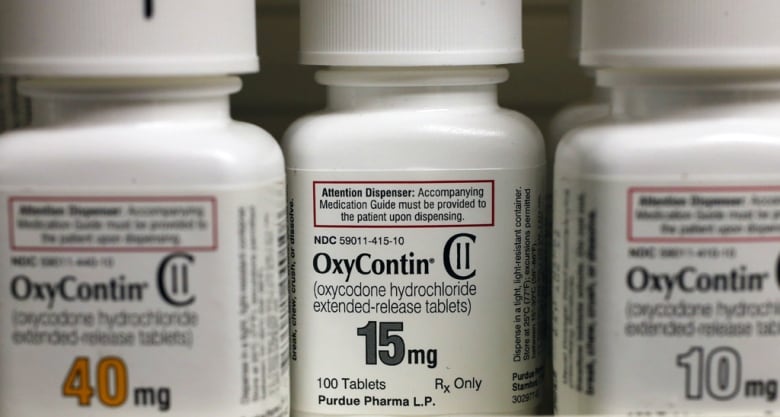Provinces pursue OxyContin maker for $67B US in costs associated with Canada's opioid crisis
‘Staggering’ claims against Purdue Pharma filed in U.S. bankruptcy court

In an effort to claw back the public health-care costs incurred by the opioid crisis, Canada's provinces have filed a $67.4-billion US claim against OxyContin producer Purdue Pharma.
The provinces are some of the more than 600,000 claimants listed in documents filed against Purdue Pharma on Nov. 5 in the U.S. Bankruptcy Court for the Southern District of New York.
OxyContin was introduced about two decades ago, marking what addiction experts recognize as the beginning of the opioid crisis. The drug quickly spread to the streets, leading to a full-blown public-health crisis involving various other opioids and eventually a devastating influx of fentanyl, which killed many of the more than 4,500 Canadians who died of drug overdoses in 2018 alone.
British Columbia's claim is for more than $9.1 billion US, while Ontario's is $26.1 billion US, and Quebec's is $15.3 billion US.

Reidar Mogerman is the lawyer handling the class action cost recovery litigation for British Columbia. He says this situation is comparable to past societal actions after mass public injury was caused by tobacco and asbestos.
"The Canadian number looks large and it is large because it's a significant problem. I believe if you add in claims from U.S. entities you get numbers in excess of $2 trillion US. It's really staggering," said Mogerman.
In the United States, Purdue paid $634.5 million US about 13 years ago to settle litigation after being charged with misbranding OxyContin as less addictive than other prescription pain medications.
Health Canada has never investigated Purdue.
"It's a product that we thought was useful and it turned out to be extremely dangerous. The carnage can only be addressed with society-wide tools," said Mogerman.
Society-wide health care crisis created
He explained that as the drug maker became overwhelmed by claims related to the opioid crisis it moved to apply to the U.S. courts for bankruptcy protection, which has stalled the legal process.

Mogerman says Purdue continues to sell opioids in Canada and the U.S., but the way they are used and marketed has become safer.
However, the fallout from the introduction of OxyContin has been a "society-wide health care crisis," he said.
Three years ago Canadian provinces seemed willing to whittle down their $85.5-billion Canadian claim — for everything from emergency medical care to overdose prevention sites and addiction treatment programs — to a $2 million share of the settlement offer.
But outspoken Saskatchewan judges raised the alarm that the provinces were failing to protect public funds.
Purdue initially offered $20 million Cdn to settle a 1,600-member victim-centred Canadian class-action lawsuit that's been ongoing since 2007.
But in the end provinces withdrew their support, after the judges' rebuke.
In 2018 the B.C. government launched its own lawsuit against more than 40 pharmaceutical companies, including Purdue. That claim alleges they knew, or should have known, that opioids were addictive and leaking into the illegal market.
But all claims were frozen after Purdue sought bankruptcy protection in 2019.
Mogerman says patient claims began to be at odds with provincial interests — so they had to move another way.
He said B.C. takes this crisis so seriously that billions have been spent trying to solve it.
"The province needed to protect the larger public interest that it's trying to pursue," he said.
"But nobody has a silver bullet. It's not an easy thing to solve."
He predicts a reckoning will come and pharmaceutical companies will pay B.C. and other provinces compensation or his team will pursue the company and the family who owns it.
"We will pursue the cases to the ends of the earth if we need to," he said.

